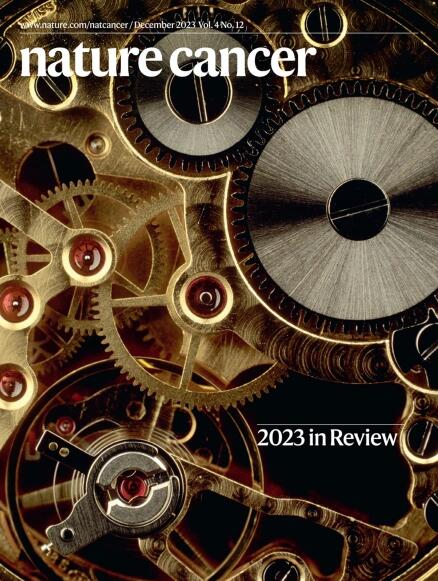Atezolizumab plus personalized neoantigen vaccination in urothelial cancer: a phase 1 trial
IF 28.5
1区 医学
Q1 ONCOLOGY
引用次数: 0
Abstract
Features of constrained adaptive immunity and high neoantigen burden have been correlated with response to immune checkpoint inhibitors (ICIs). In an attempt to stimulate antitumor immunity, we evaluated atezolizumab (anti-programmed cell death protein 1 ligand 1) in combination with PGV001, a personalized neoantigen vaccine, in participants with urothelial cancer. The primary endpoints were feasibility (as defined by neoantigen identification, peptide synthesis, vaccine production time and vaccine administration) and safety. Secondary endpoints included objective response rate, duration of response and progression-free survival for participants treated in the metastatic setting, time to progression for participants treated in the adjuvant setting, overall survival and vaccine-induced neoantigen-specific T cell immunity. A vaccine was successfully prepared (median 20.3 weeks) for 10 of 12 enrolled participants. All participants initiating treatment completed the priming cycle. The most common treatment-related adverse events were grade 1 injection site reactions, fatigue and fever. At a median follow-up of 39 months, three of four participants treated in the adjuvant setting were free of recurrence and two of five participants treated in the metastatic setting with measurable disease achieved an objective response. All participants demonstrated on-treatment emergence of neoantigen-specific T cell responses. Neoantigen vaccination plus ICI was feasible and safe, meeting its endpoints, and warrants further investigation. ClinicalTrials.gov registration: NCT03359239 . Galsky and colleagues report the results of a phase 1 clinical trial of anti-programmed cell death protein 1 ligand 1 atezolizumab in combination with PGV001, a personalized neoantigen vaccine, in participants with urothelial cancer.

Atezolizumab加个体化新抗原疫苗治疗尿路上皮癌:1期试验
限制性适应性免疫和高新抗原负担的特征与免疫检查点抑制剂(ICIs)的应答相关。为了刺激抗肿瘤免疫,我们评估了atezolizumab(抗程序性细胞死亡蛋白1配体1)与PGV001(一种个性化新抗原疫苗)在尿路上皮癌患者中的联合应用。主要终点是可行性(根据新抗原鉴定、多肽合成、疫苗生产时间和疫苗给药的定义)和安全性。次要终点包括客观缓解率、缓解持续时间和转移性治疗参与者的无进展生存期、辅助治疗参与者的进展时间、总生存期和疫苗诱导的新抗原特异性T细胞免疫。12名入组参与者中的10名成功制备了疫苗(中位数为20.3周)。所有开始治疗的参与者都完成了启动周期。最常见的治疗相关不良事件是1级注射部位反应、疲劳和发烧。在39个月的中位随访中,4名接受辅助治疗的参与者中有3名没有复发,5名接受可测量疾病转移性治疗的参与者中有2名获得了客观缓解。所有参与者都表现出治疗后出现新抗原特异性T细胞反应。新抗原疫苗接种加ICI是可行和安全的,满足其终点,值得进一步研究。ClinicalTrials.gov注册:NCT03359239。
本文章由计算机程序翻译,如有差异,请以英文原文为准。
求助全文
约1分钟内获得全文
求助全文
来源期刊

Nature cancer
Medicine-Oncology
CiteScore
31.10
自引率
1.80%
发文量
129
期刊介绍:
Cancer is a devastating disease responsible for millions of deaths worldwide. However, many of these deaths could be prevented with improved prevention and treatment strategies. To achieve this, it is crucial to focus on accurate diagnosis, effective treatment methods, and understanding the socioeconomic factors that influence cancer rates.
Nature Cancer aims to serve as a unique platform for sharing the latest advancements in cancer research across various scientific fields, encompassing life sciences, physical sciences, applied sciences, and social sciences. The journal is particularly interested in fundamental research that enhances our understanding of tumor development and progression, as well as research that translates this knowledge into clinical applications through innovative diagnostic and therapeutic approaches. Additionally, Nature Cancer welcomes clinical studies that inform cancer diagnosis, treatment, and prevention, along with contributions exploring the societal impact of cancer on a global scale.
In addition to publishing original research, Nature Cancer will feature Comments, Reviews, News & Views, Features, and Correspondence that hold significant value for the diverse field of cancer research.
 求助内容:
求助内容: 应助结果提醒方式:
应助结果提醒方式:


